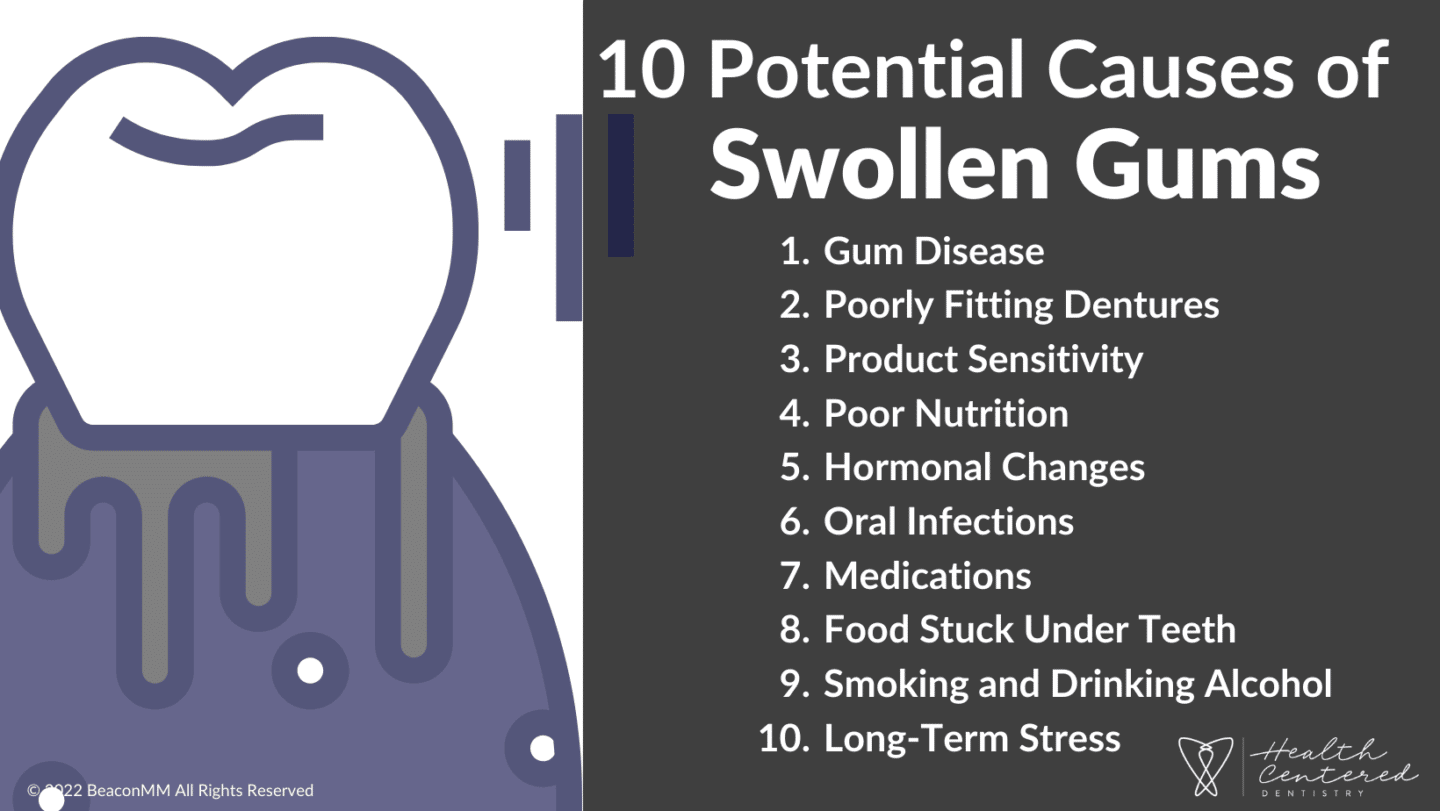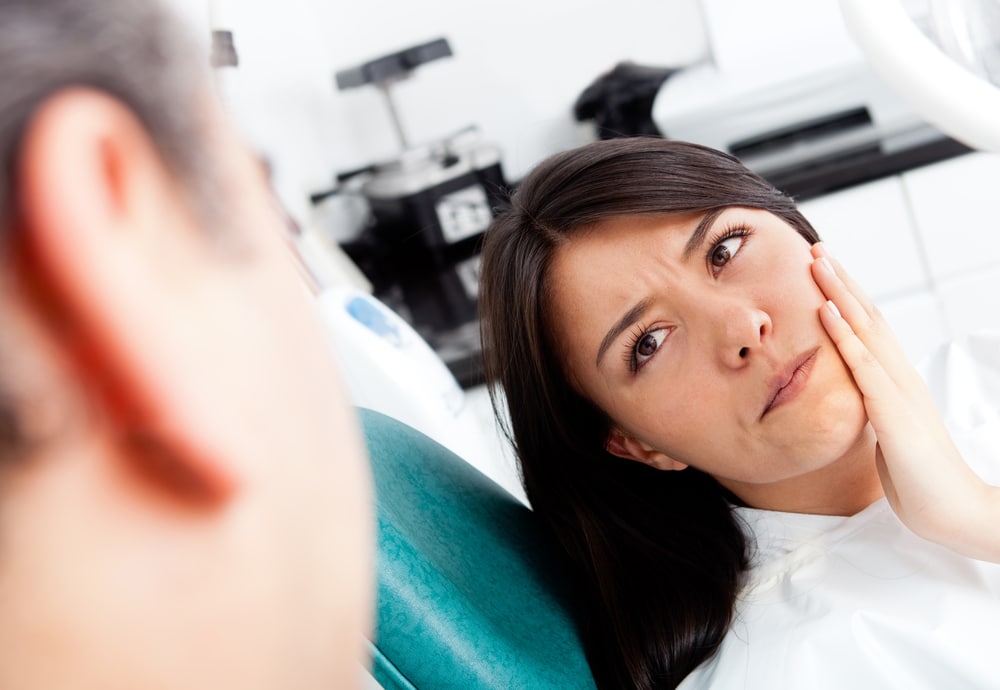Do you have healthy gums? If so, they should be pink, firm, and mostly pain-free. However, if your gums appear swollen and red, are bleeding, or are painful, you might have a dental health problem or something else that affects your gums.
Are you wondering, “Why are my gums swollen?” Set up an appointment at Health Centered Dentistry to find out why and how we can help.
Why Are My Gums Swollen?

When your gums are swollen, more often than not, there’s something wrong. Like in many other medical or dental conditions, finding the solution begins with discovering the cause. Sometimes, the answer is obvious, even to you. If you have poor dental hygiene habits or are a habitual smoker, gum pain inflammation might not come as a surprise.
However, other times, we must dig deeper to uncover the root cause of the problem. At Health Centered Dentistry, we use exams, x-rays, a variety of tests, and an in-depth interview with you to find the cause of your swollen gums. Here are some things that can cause swollen gums.
1. Gum Disease
Gum disease is a serious dental condition that requires long-term treatment. The first stage of this disease is gingivitis, which is when the gums become red and swollen. Gum disease, also called periodontal disease, is a severe infection. In most cases, it is caused by poor dental hygiene, such as inadequate brushing and flossing.
If you go to your dentist right away – as soon as you notice your gums are swollen – we can begin treatment. If not, your gums can deteriorate even more, first bleeding, then pulling away from the teeth. After that, you could lose bone and teeth, changing your mouth forever.
As a part of our Restorative Dentistry services, we offer periodontal treatment – that is, treatment for gum disease. Although gum disease is a serious problem, at Health Centered Dentistry, we can help you improve your oral health.
2. Poorly Fitting Dentures
When you first get dentures, you might go through some adjustments to ensure a proper fit. Soon, your dentures fit nicely, and you go on with your life. What you need to know is that most people require occasional denture adjustments for as long as they have dentures.
You might notice a specific part of your dentures that are rubbing. In other cases, you might just have a general discomfort when you put them in your mouth or after hours of wearing them. Your dentist can quickly find the area that needs to be adjusted and may use special tools to improve the fit.
3. Sensitivity
For some people, swollen gums are a sign of sensitivity to any of a variety of products. You might be sensitive to a specific toothpaste, mouthwash, or teeth whitening agent. Our dentist or hygienist can find alternate products for you that do the job without irritating your gums.
4. Poor Nutrition
When you do not eat the foods that contribute to your dental health, it can affect not only your teeth but also your gums. What’s more, if you eat a high-sugar diet, your gums can become inflamed. Although scurvy is fairly uncommon these days, sometimes, people who don’t eat healthy foods can still get it. All these food-related issues can cause inflammation in your gums.
5. Hormonal Changes
When your hormones drastically change, your entire body can be affected, including your gums. This often happens during pregnancy. In fact, it is one of the reasons we recommend continuing your routine dental visits when you are expecting a baby. At your visit, we can check this and other dental factors. We want to keep you healthy, no matter what hormonal changes you are going through now.
6. Oral Infections
If your gums are swollen, it might be a sign that you have an oral infection. Infections in your mouth are often viral or fungal. Some of the most common oral infections are herpes and oral thrush. By getting to the bottom of what the infection is, we not only help you achieve better gum health, but we help you maintain your overall physical well-being.
7. Medications
Some medications can make your gums swell. One such type of medication is certain high blood pressure medications. There might be many different solutions to this problem. You might request that your doctor uses a different medication for your hypertension. If not, our dentist can approach the issue in other ways.
8. Food Stuck Under Teeth
Even if you usually brush and floss carefully, it is still possible to get food stuck under your teeth at one time or another. Depending on your oral health, you may not notice it until your gums are inflamed. Your dentist will check your entire mouth during the dental exam. They may use small instruments to check every tooth and any pockets in your gums. Once we remove the offending food, we advise you on how to get your gums back to a healthier condition.
9. Smoking and Drinking Alcohol
Smoking and drinking alcohol are rough on your teeth. Smoking reduces the amount of oxygen in your bloodstream. Therefore, once your gums face even a minor infection, they don’t have the oxygen needed to heal properly. Smoking also increases the amount of dental plaque in your mouth, which contributes to gum inflammation and gum disease.
Alcohol dries out your mouth. Once the saliva decreases, it can no longer do its job of washing away bacteria. That means the bacteria will stick to your tooth’s enamel. The sugar content in alcohol can also have the same effect as sugary foods, as well. When you drink alcohol regularly, your gums may start bleeding, and you are more likely to get tooth decay and gum disease.
We can also teach you how to maintain a healthy pH level in your saliva, which can prevent many problems in your gums and teeth. To read more about how to normalize your mouth’s pH, check out our blog on “Why the pH Level of Your Saliva Is Important for Your Dental Health.”
10. Long-Term Stress
Are you wondering how stress could cause gum disease? Long-term stress can wear down your immune system. Then, the bacteria in your mouth can take over. If that happens, you can get gingivitis, which is an infection of the gums.
Could I Have Gum Disease?
Red and swollen gums are just two of the symptoms of gum disease. You may also have bad breath, no matter what you try to do to freshen it. Your gums may bleed or feel tender. It might be painful to chew. Your teeth might get loose or even fall out. Your teeth sensitivity might increase. Your gums may begin to recede, causing your teeth to look longer.
However, whether you have the more severe signs of gum disease or just notice some swelling, it is critical that you get to your dentist as soon as possible. No matter what your situation is, we can offer help for swollen gums, gingivitis, or even gum disease. The sooner you visit your dentist, the faster the healing can begin.
How Swollen Gums Affect Your Overall Health
Swollen gums can be painful. Yet, even when you don’t notice any discomfort, they can damage your health. If your gums are chronically inflamed, you might suffer any of various complications, including the following:
- Tooth loss
- Stroke
- Heart attack
- Increased risk of Alzheimer’s disease
- Increased risk of certain cancers
- Respiratory disease
- Rheumatoid arthritis
- Coronary artery disease
- Poor blood sugar control in diabetes
Besides these medical conditions, poor oral health can cause poor eating habits. Whether your teeth or gums hurt, you are less likely to eat healthy raw fruits and vegetables. Eating may become so uncomfortable that you don’t eat enough healthy foods to maintain your overall health. Find out how we take care of your overall well-being in “A Whole-Body Approach to Natural Dentistry Care for the Whole Family.”
How Health Centered Dentistry Relieves Swollen Gums
At Health Centered Dentistry, we take special care of your gums. First, we find the answer to your question, “Why are my gums swollen?” Then, we advise you on how to take better care of your gums. Then, we provide any treatments appropriate for your gums and teeth. Finally, with preventative care from us and good oral hygiene from you, your gums can be pink, firm, and pain-free again.
Could a dental visit be your solution to swollen gums? Schedule an appointment at HCD for healthier gums.


